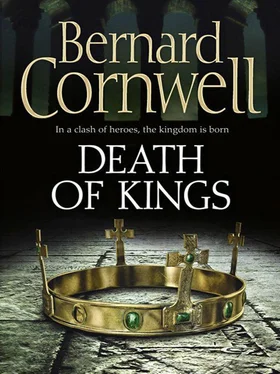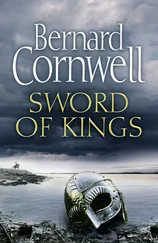I sent more messengers to Edward, only this time I sent Finan because I knew the king would listen to the Irishman, and I sent him with seven other men. They were to ride west before crossing the Temes, then go fast towards Wintanceaster or to wherever else the king might be, and they carried a letter I wrote myself. Men are always surprised that I can read and write, but Beocca taught me when I was a child and I have never lost the skills. Alfred, of course, insisted that all his lords should learn to read, mainly so that he could write his chiding letters to us, but since his death not many bother to learn, yet I still have the skills. I wrote that the Danes were cursed with too many leaders, that they were lingering too long just south of the Temes, that I had slowed them by taking horses and leaving them with a mass of wounded men. Come towards Cracgelad, I urged the king. Collect every warrior, I urged him, call the fyrd, and advance on the Danes from the south and I would be the anvil against which he could beat the enemy into blood, bones and raven-food. If the Danes moved, I said, I would shadow them on the northern bank of the Temes to block their escape, but I doubted they would move far. ‘We have them in our hand, lord King,’ I wrote, ‘and now you must close the fist.’
And then I waited. The Danes did not move. We saw the smoke pyres in the distant southern sky that told us they were scouring a wider area of Wessex, but their main encampment was still not far south of Cracgelad’s bridge, which we now had made into a fortress. No one could cross the bridge unless we allowed it. I went over each day, taking fifty or sixty men to patrol a short distance on the southern bank to make certain the Danes were not moving, and each day I returned to Cracgelad astonished that the enemy was making it so easy for us. At night we could see the glow of their campfires lighting the southern sky and by day we watched the smoke, and in four days nothing changed except the weather. Rain came and went, the wind stirred the river and an early autumn mist obscured the ramparts one morning, and when the mist lifted the Danes were still there.
‘Why aren’t they moving?’ Æthelflaed asked me.
‘Because they can’t agree where to go.’
‘And if you led them,’ she asked, ‘where would they go?’
‘To Wintanceaster,’ I said.
‘And besiege it?’
‘Capture it,’ I said, and that was their difficulty. They knew men would die in the burh’s ditch and on its high wall, but that was no reason not to try. Alfred’s burhs had given the enemy a riddle they could not solve, and I would have to find a solution if I was to retake Bebbanburg, a fortress that was more formidable than any burh. ‘I’d go to Wintanceaster,’ I told her, ‘and I’d hurl men at the wall until it fell, and then I’d make Æthelwold king there and demand that West Saxons follow me, and then we’d march on Lundene.’
Yet the Danes did nothing. They argued instead. We heard later that Eohric wanted the army to march on Lundene, while Æthelwold reckoned it should assault Wintanceaster, and Cnut and Sigurd were all for recrossing the Temes to capture Gleawecestre. So Eohric wanted to bring Lundene into his kingdom’s boundaries, Æthelwold wanted what he believed was his birthright, while Cnut and Sigurd simply wanted to extend their lands southwards to the Temes, and their arguments left the great army drifting in indecision, and I imagined Edward’s messengers riding between the burhs, gathering the warriors, bringing together a Saxon army that could destroy the Danish power in Britain for ever.
Then Finan returned with all the messengers I had sent to Wintanceaster. They crossed the Temes well to the west, looping about the Danes, and came to Cracgelad on horses that were sweat-whitened and dust-covered. They brought a letter from the king. A priestly clerk had written it, but Edward had signed it and the letter bore his seal. It greeted me in the name of the Christian god, thanked me effusively for my messages, and then ordered me to leave Cracgelad immediately and to take all the forces under my command to meet the king in Lundene. I read it in disbelief. ‘Did you tell the king we have the Danes trapped on the river?’ I asked Finan.
Finan nodded, ‘I told him, lord, but he wants us in Lundene.’
‘Doesn’t he understand the opportunity?’
‘He’s going to Lundene, lord, and he wants us to join him there,’ Finan said flatly.
‘Why?’ And that was a question no one could answer.
I could do no good on my own. I had men, true, but not nearly enough. I needed two or three thousand warriors to come from the south, and that was not going to happen. Edward, it seemed, was taking his army to Lundene, going by a route that kept him well clear of any Danish outriders. I swore, but I had sworn an oath to obey King Edward and my oath-lord had given me an order.
So we unlocked the trap, let the Danes live and rode to Lundene.
King Edward was already in Lundene and the streets were filled with warriors, every courtyard was being used as a stable, even the old Roman amphitheatre was crammed with horses.
Edward was in the old Mercian royal palace. Lundene was properly in Mercia, though it had been under West Saxon rule ever since I had captured it for Alfred. I found Edward in the big Roman chamber with its pillars, dome, cracked plaster and shattered tile floor. A council was in session, and the king was flanked by Archbishop Plegmund and by Bishop Erkenwald, while facing them, in a semicircle of benches and chairs, sat more churchmen and a dozen ealdormen. The banners of Wessex were propped at the back of the chamber. A lively discussion was under way as I entered, and the voices fell silent as my feet sounded loud on the broken floor. Scraps of tile skittered away. There had been a picture made with the tiles, but it had vanished by now.
‘Lord Uhtred,’ Edward greeted me warmly, though I noted a slight nervousness in his voice.
I knelt to him. ‘Lord King.’
‘Welcome,’ he said, ‘and join us.’
I had not cleaned my mail. There was blood in the gaps between the tight rings and men noticed it. Ealdorman Æthelhelm ordered a chair brought next to him and invited me to sit there. ‘How many men do you bring us, Lord Uhtred?’ Edward asked.
‘Steapa is with me,’ I said, ‘and counting his men we have five hundred and sixty-three.’ I had lost some in the fighting at Cracgelad, and others had fallen behind because of lamed horses as we rode to Lundene.
‘Which makes a total of?’ Edward asked a priest seated at a table to the side of the chamber.
‘Three thousand, four hundred and twenty-three men, lord King.’
He obviously meant household warriors, not the fyrd, and it was a respectable army. ‘And the enemy?’ Edward asked.
‘Four to five thousand men, lord, as best we may judge.’
The stilted conversation was plainly meant for my ears. Archbishop Plegmund, face as sour as a shrivelled crab apple, watched me closely. ‘So you see, Lord Uhtred,’ Edward turned back to me, ‘we did not have enough men to force an encounter on the banks of the Temes.’
‘The men of Mercia would have joined you, lord King,’ I said. ‘Gleawecestre is not so far away.’
‘Sigismund has landed from Ireland,’ Archbishop Plegmund took up the tale, ‘and has occupied Ceaster. The Lord Æthelred needs to watch over him.’
‘From Gleawecestre?’ I asked.
‘From wherever he decides,’ Plegmund said testily.
‘Sigismund,’ I said, ‘is a Norseman who’s been run out of Ireland by the native savages, and he’s hardly a threat to Mercia.’ I had never heard of Sigismund before and had no idea why he had chosen to occupy Ceaster, but it seemed a likely explanation.
Читать дальше
Конец ознакомительного отрывка
Купить книгу












